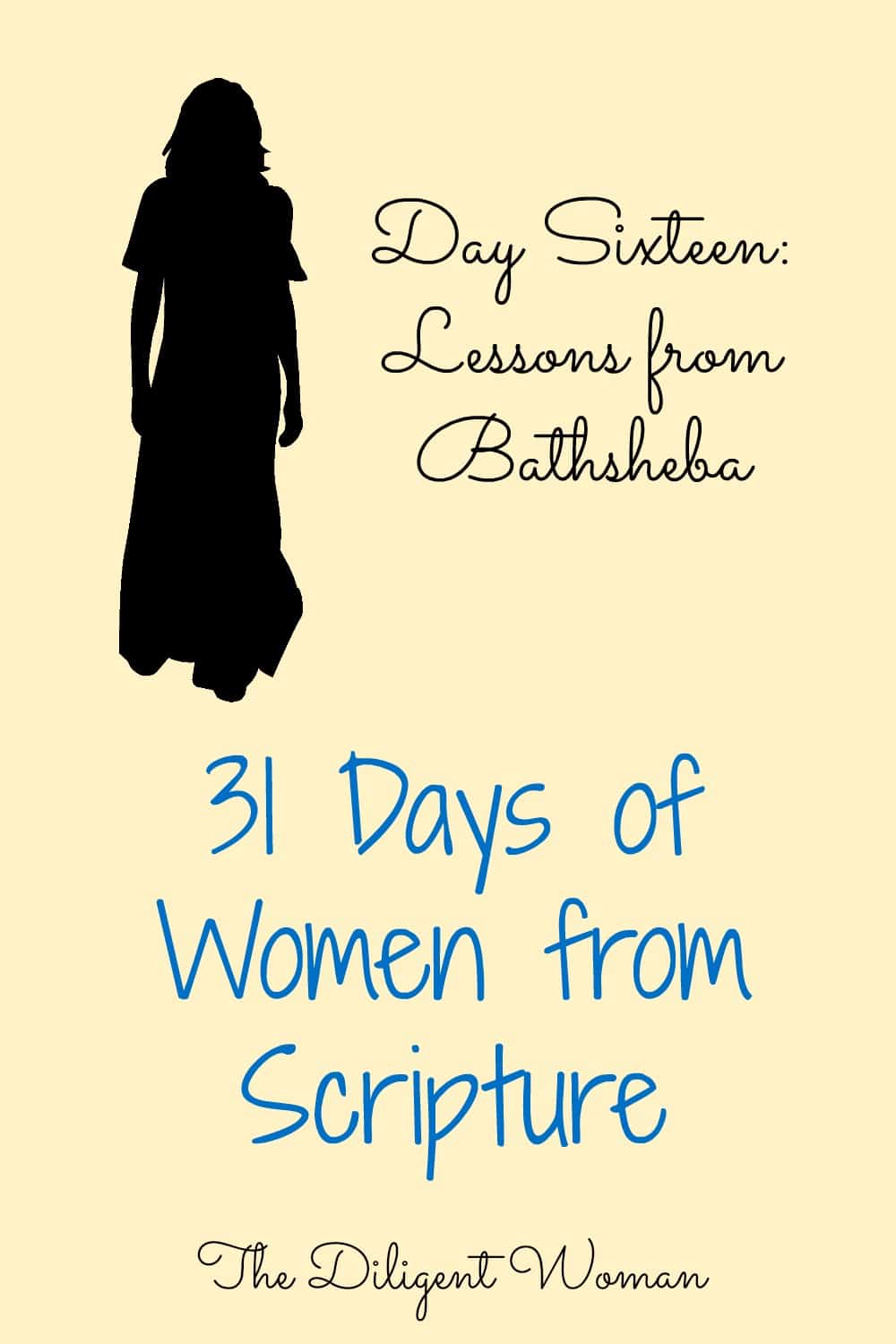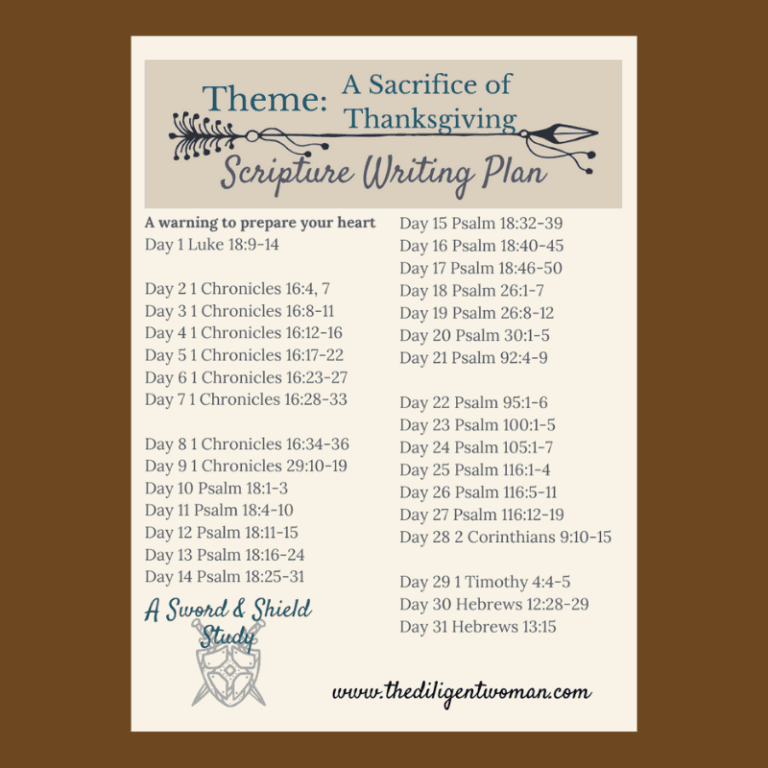Lessons from Bathsheba
31 Days of Women from Scripture
Day Sixteen
Lessons from Bathsheba
Many people are aware of this story, David and Bathsheba, but let’s start off by hitting the highlights.
In the spring when kings go out to battle, King David sent Joab to fight Ammon and beseige Rabbah, but David stayed in Jerusalem. In the evening David got up and walked around the roof of his house. From the roof he saw a very beautiful woman bathing. David inquired about her and found out she was the wife of Uriah the Hittite. David sent messengers, took her, and when she was brought to him, he lay with her. The woman conceived and sent a message to David telling him that she is pregnant. (2 Sam. 11:1-5).
David sends a message to Joab, at the battle, to send Uriah the Hittite back to David. Uriah comes to David. David inquires about the war and then send Uriah home to rest, sending a gift along behind him. Uriah does not go home though. Uriah refused to take comfort while the battle for the people was going on. David insisted that Uriah stay in Jerusalem two more days. David feasts with Uriah and gets Uriah drunk – even then Uriah would not go home (2 Sam. 11:6-13).
When David’s plan to get Uriah to sleep with his wife did not work, David wrote a letter to Joab and sent Uriah back to battle carrying the letter. The letter told Joab to put Uriah on the front lines of the fiercest battle and to pull back so that Uriah will be killed. Joab did as David requested. David tells Joab not to worry about the death of Uriah, “for the sword devours one as well as another” (2 Sam. 2:25). When Bathsheba, the wife of Uriah, learns of her husband’s death she mourns him. When the time of mourning was over, David sent for her and made her his wife and she bore him a son. “But the thing that David had done was evil in the sight of the Lord” (2 Sam. 11:14-25).
Sometime later, the son of David and Bathsheba became very ill. After seven days of illness the child died. David comforted Bathsheba, she conceived and gave birth to another son, Solomon (“peaceful”). This child the Lord loved – and he sent Nathan to name the child “Jedidiah” which meant “beloved of the Lord”.
That’s the story. Here is what we know –
David was not where he was supposed to be (2 Sam. 11:1).
God held David accountable for this sin (2 Sam. 12:1-15), not Bathsheba. She bore the consequence because she lost her son, but the reason for the loss was on David’s head (2 Sam. 12:14).
The Bible makes it clear that this sin is David’s. He saw, he wanted, he took. When his deed went bad, he sinned further by lying and committing murder to cover what he had done (2 Sam. 12:9).
There is nothing in scripture that indicates Bathsheba did anything wrong in her actions. Nowhere does it say she was naked. Full body bathing was not normally done at this time, as it is today. The public nudity of the Greeks and Romans was a long time yet to come. Many Renaissance artists liked to portray Bathsheba as nude, but I suspect that had more to do with a reason to view a nude female than it did to give a true representation of the facts of the story. Most translations of scripture indicate that “she had purified herself from her uncleanness” in 2 Samuel 11:4. This would show that she was keeping the law and was purifying herself after her monthly cycle was ended (Lev. 12:2-5; Lev. 15:19-33; Lev. 18:19). Scripture indicates this was something that David did against her and Uriah (2 Sam. 12:3-4, 9).
Here we have another woman being put into a situation because a man did not have her best interests in mind. David did not protect this woman. Bathsheba did what she could. She did not allow his sin to go hidden. She forced David to deal with his actions (Mt. 18:15-18). The light of truth is meant to push back the darkness of sin (Ps. 18:28; 2 Cor. 4:6-7). David moved further towards darkness when he instructed that Uriah be killed. As with Ahab, David is guilty of killing Uriah himself even though he used the hands and swords of Ammon to accomplish it (2 Sam. 12:9). Bathsheba bore not part in this sin. It was David’s own.
The lesson for us – 1. avoid men who seek to be with you because their own lust is out of control . Protect yourself from situations and do not assume that others will look out for you (Deut. 22:22-27; Prov. 1:10-19; Prov. 5:1-14; Prov. 7). 2. Do NOT take upon yourself guilt that is not your own! When someone does something to you, do not help them to hide their sin. Their shame is NOT your shame. Do not listen to the lies that tell you otherwise. God has provided leadership, husbands, fathers, and government to uphold the righteous and to punish the evildoer (Rom. 13:3-4). When someone around you sins against you, go to a good man and shine light into the darkness by telling the truth. As we have seen with all of the women we have studied, you have a choice as to how you will behave. You cannot control the behavior of others. God is just – He holds each of us accountable for our own actions (Phil. 2:10; 1 Pet. 1:17).
Bathsheba is blessed by getting another son, Solomon. The next time we see her is in 1 Kings 1:11-31. David is old. His son, Adonijah (2 Sam. 3:2-5) has exalted himself to be king. The prophet Nathan goes to Bathsheba and sends her to remind David of the promise he made to her, that Solomon would be king after him (1 Chron. 22:6-10). David again makes his promise that Solomon will be king to Bathsheba in front of Nathan (1 Kings 1:28-31).
In 1 Kings 2, after the death of David, Adonijah comes to Bathsheba and asks that she request that the woman who cared for David in his final days be given to Adonijah for a wife. Adonijah believes that Solomon will not refuse anything his mother asks (1 Ki. 2:17). Bathsheba agrees. Bathsheba goes to see her son, King Solomon. She tells him of Adonijah’s request. Solomon sees the request as what it really is, an attempt to undermine his throne. Solomon orders that Adonijah be executed (1 Ki. 2:23-25).
Solomon refers to the teachings of his father and his mother in the book of Proverbs (Prov. 4:3; Prov 6:20), he talks about her helping him prepare for his wedding in Song of Solomon 3:11. Bathsheba is then mentioned along with Tamar, Rahab, Ruth, and Mary in the lineage of Christ in Matthew 1:6.
This woman is held up as being important in the thread that brings Christ to us on earth. The primary situation of her life that God chose to show us has many lessons for us – both from Bathsheba and from David. We can see what we should try to avoid in our own relationships.
Take from Bathsheba the confidence to do what YOU can in a given situation. Philippians 2:4 says, “Let each of you look out not only for his own interests, but also for the interests of others.” Unfortunately, others may not do that for you. So you need to take care of your part. Proverbs 3:5 says, “Trust in the Lord with all your heart and do not lean on your own understanding.” Let your light shine (Mt. 5:14-16) with the light of truth (Ps. 119:105; 2 Pet. 1:19-21; Jn. 1:1-5; Jn. 3:21)!
Enjoy!




This is an excellent perspective on Bathsheba. David was the one in power, summoning who he willed. So, one might ask, in reviewing the lesson questions at the end, what excuse would Bathsheba have given not to go see the King in the first place? Would she have been like Vashti, suffering retribution (analogy not totally on point here, admittedly) or, in the midst of David’s seduction, flee like Joseph did from Potiphar’s wife?